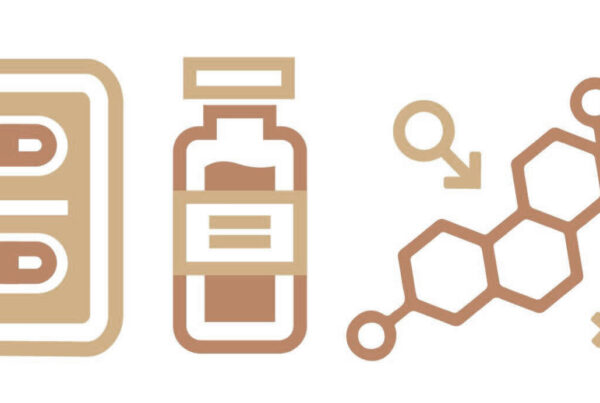Lowered levels of testosterone can have many negative effects, including the diminishing of a man’s sex drive, as well as reduced performance, energy, and motivation in bed. However, testosterone replacement therapy, or TRT, could potentially boost a man’s T levels back to normal and help him regain this part of his life.
When are Testosterone Levels too Low?
There is no evidence to suggest that testosterone therapy can benefit a man whose levels fall within the normal range, so first and foremost it is important to understand exactly what is “normal”. Medically speaking, the accepted normal range for testosterone falls within about 300 ng/dL (nanograms per deciliter) to 900 ng/dL. However, one thing that it is crucial to understand is that while this range indicates the total amount of testosterone shown to exist, it may not be fully indicative of what is really happening with his body.
In addition to the total measurement of testosterone within a man’s body, doctors must also take into account what is known as “free testosterone”. This measurement is an indicator of how much of the hormone is actually active within a man’s body at any given time. Because of this, a man can appear to have testosterone levels within his body that fall within the normal range, but may show some of the classic symptoms of low T if he is still short when it comes to overall measurements of free testosterone.
The Benefits of TRT
The most obvious benefits of TRT, naturally, are related to the sexual difficulties and frustrations that are the result of low T levels within the body. TRT treatment can vastly improve a man’s interest in sexual activity, as well as improve his ability to gain and maintain an erection. In addition to that, it can help improve his overall satisfaction with his orgasms.
While they may be the most obvious benefits to beginning TRT, they are in fact not the only benefits that a man may encounter if he decides to go this route with his treatment. There are numerous significant health benefits to boosting one’s testosterone levels as well, all of which can vastly improve a man’s quality of life. Normal testosterone levels have been shown to have a proven impact on issues ranging from metabolic syndrome and osteoporosis to major health issues such as obesity and diabetes.
Longevity is also a factor, as lowered testosterone levels have been linked in the past to lowered life expectancy among men. Quite simply put, those men who have levels of testosterone below the normal range generally die sooner than those men who do fall within the normal range.
At present, it is still unknown as to why this may be the case, though numerous different factors likely play a role. Because of this, it is also unknown as to whether boosting a man’s levels of testosterone back to normal with TRT would have any significant impact on his life expectancy. However, factors such as the increase of muscle mass and decrease of fat mass while on testosterone indicate that there is a possibility that this would be the case.
Other benefits of TRT are clearer and easier to understand. For example, returning a man’s testosterone levels back to normal can have a tremendous impact on strengthening his bones and preventing the bone disease osteoporosis. Additionally, studies have shown that the treatment has an impact in the aiding of blood sugar control, a factor that may make it crucial in the prevention as well as control of diabetes in some men.
When it comes to factors such as heart health, testosterone may also play a significant role. Lowered levels of testosterone have been linked to having a much higher risk of cardiovascular issues and disease. However, it is as of yet uncertain as to how lowered testosterone levels would lead to heart issues.
Overall, what is certain is that testosterone therapy can have a tremendous impact on a man’s quality of life, far beyond the sexual benefits that it can provide. Even surface benefits, such as improving mood, reducing irritability, and boosting a man’s energy levels can have a huge impact on his quality of life.
Does TRT Carry Any Risks?
Naturally, any form of medical treatment carries some kind of risk. It is important to be aware of these factors before beginning TRT or any other form of treatment. TRT’s most notable risk is that it can raise the likelihood of a blood clot or a stroke. However, this is a risk that can be offset by the donation of blood on occasion. Other side effects of the treatment, which are less common but must still be noted, include acne and sleep apnea in addition to enlargement of the breasts. These side effects will generally cease once treatment has been stopped.
Special care must be taken when using testosterone gels or creams. Men must be sure to wash the gel or cream from their hands thoroughly after the application of a dose, and they must be careful to ensure that nobody else touches the spots on their body where they are applying the gel or cream for treatment. It is especially important that women and children do not come into contact with these creams or gels, as it could lead to significant side effects including hair growth and premature puberty.
The transference of the medication to women or children is incredibly rare. However, it is still advisable for men using these types of treatments to avoid skin-to-skin contact with any women or children for about two to four hours once he has applied the medication.
Men taking this medication must be aware also that they will only continue to receive the benefits of the treatment while they are still on it. Once they cease treatment, their prior symptoms are likely to return.
One final thing to take note of is the question of whether or not testosterone replacement therapy poses a prostate cancer risks. There has been much research done on the subject over several decades, and while little evidence has been turned up, the question has not been entirely dismissed in the medical community. Those men who choose to take TRT may choose to receive a PSA test on an annual or biannual basis in order to assuage any concerns that they may have.





